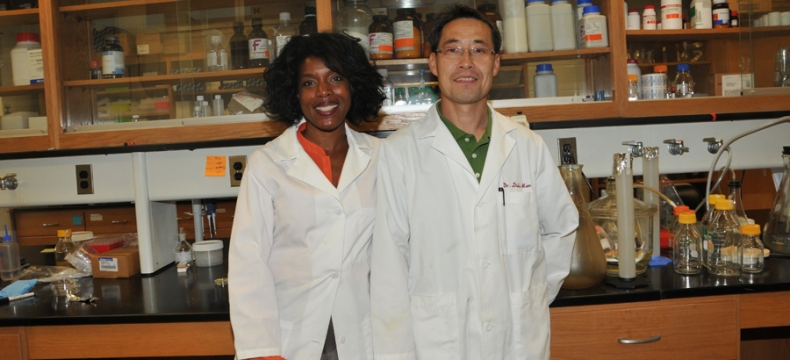
DSU Receives $1.7M Grant to Join Nemours in Establishing Delaware Comprehensive Sickle Cell Research Center
Delaware State University has received a five-year, $1,783,188 grant to partner with the Nemours Center for Cancer and Blood Disorders to establish a Delaware Comprehensive Sickle Cell Research Center.
The funding to DSU is part of a $10.2 million, five-year grant from the National Institutes of Health (NIH) to study the genetic mutation that causes sickle cell disease and to improve care and outcomes for affected children. Dr. Marie Stuart, director of hematology research at Nemours, is the principal investigator of the grant, designated as an NIH Centers of Biomedical Research Excellence (COBRE) award.
Dr. Dula Man, DSU assistant professor of chemistry, is a co-investigator of the grant, along with Dr. Robin Miller and Dr. Steven Reader, both from Nemours/Alfred I. duPont Hospital for Children.
Dr. Man’s work in the laboratory will manipulate the affected sickle red cell by a novel process of gene editing in an attempt to correct the abnormal hemoglobin in the red cell without harming other cell functions. Dr. Eric Kmiec, DSU professor of chemistry, will mentor Dr. Man.
In addition, Dr. Cherese Winstead, DSU assistant professor of chemistry and chair of the Department of Chemistry, will work on another project that will involve the growth of hematopoietic stem cells on multilayer nanofiber scaffolds.
Dr. Miller’s project, under the mentorship of Dr. Stuart, involves a clinical trial on the use of n-3 omega fatty acids for relief of pain and inflammation associated with sickle cell disease. Dr. Reader’s project with Nemours mentor Dr. Anne Kazak will modify the psychosocial assessment tool developed by Dr. Kazak to screen for risk in the pediatric population with sickle cell disease.
“This is a positive effort to enhance biomedical research in the state and the region,” said Dr. Noureddine Melikechi, dean of the DSU College of Mathematics, Natural Sciences and Technology and vice president for Research, Innovation and Economic Development. “It is the result of many years of interaction between scientists at DSU, Nemours and other institutions in Delaware to create a community of researchers interested in working on technologies that can be applied to make advances in diseases such as sickle cell anemia.”
Dr. Melikechi added: “We are grateful to Nemours and the other collaborating institutions. This is a major step forward and we look forward to taking more steps that will raise the research and educational portfolio in the state of Delaware.”
A genetic disorder of the red blood cells, sickle cell disease is a chronic and potentially debilitating disease of childhood which, in its severe form, can affect multiple organ systems and ultimately shorten the life span. Many patients face barriers that may impact quality of care and health outcomes. The grant is focused on prevention of symptoms associated with sickle cell, strong psychosocial support for families, studying the quality of care provided, and identifying genetic approaches to treatment and cure.
The grant also includes a three-year pilot study by Dr. Divya Moodalbail of Nemours, whose research will try to identify children most at-risk for developing sickle cell-related chronic kidney disease, an initial step in preventing or slowing the progression of long-term kidney damage.
In the important realm of data management, Dr. E. Anders Kolb, director of the Nemours Center for Cancer and Blood Disorders, and co-investigator Dr. David West, will work to link advances in health informatics and electronic data recording with clinical research to improve patient outcomes.
“This federal support will ensure an outstanding program to meet the ongoing needs of Delaware’s children and young adults with sickle cell disease and their families. It is a tribute to the excellence of the team in what is an extremely competitive funding environment,” said Dr. Vicky Funanage, director of Nemours Biomedical Research.

